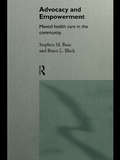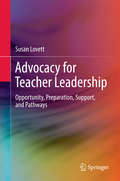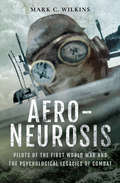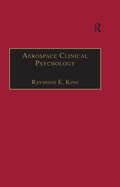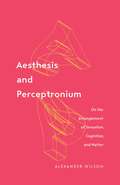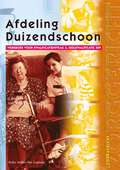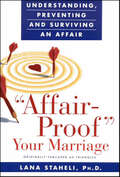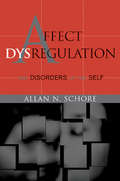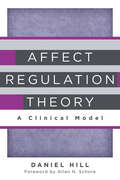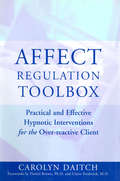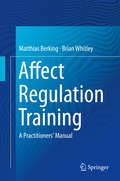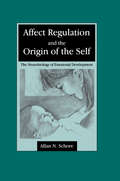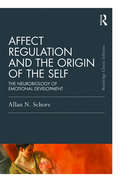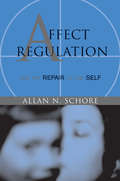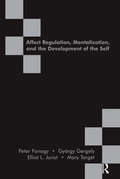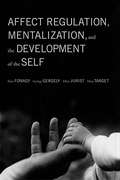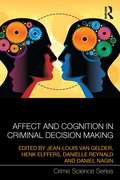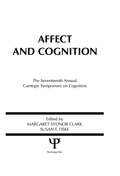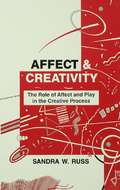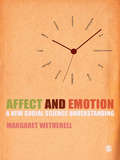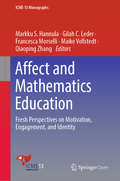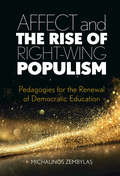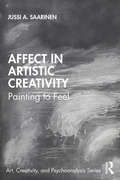- Table View
- List View
Advocacy and Empowerment: Mental Health Care in the Community
by Bruce L. Black Stephen M. RoseRelevant and thought-provoking, describes a new and imaginative approach to the needs of de-institutionalised people returning to care in the community. It shows that there is a challenging but dynamic contribution to be made by all community mental health workers in restoring dignity to the lives of those who have tragically been robbed of such a basic human need.
Advocacy for Teacher Leadership: Opportunity, Preparation, Support, and Pathways (SpringerBriefs in Education)
by Susan LovettThis book advocates for an alternative to the hierarchical positioning of leaders. It proposes to value leadership practices which emerge from collective concerns about learning and the realisation that collegial interactions offer opportunities for rich explorations of pedagogy and new understandings to be developed. The book draws upon illustrative examples from a longitudinal study of early career teachers, entitled "Teachers of Promise: Aspirations and realities". It explores matters of personal ambition, support from significant others, and barriers to teacher leadership. It shows that these vary from context to context and individual to individual. Examples highlight the ways in which each teacher's experience has been enabled and constrained by different considerations. In combination, the examples offered demonstrate the need for the teaching profession to be more systematic in identifying and supporting talented teachers who could be the leaders of learning for tomorrow. The book shows that individuals themselves need to have an openness to consider how they might become more effective teachers through their engagement in leadership work. This, it suggests, involves developing a different conception of leadership to counter the prevailing view that leadership is typically positional and defined by its distance from classroom teaching. The more promising portrayal is to link teacher leadership explicitly with learning.
Aero-Neurosis: Pilots of the First World War and the Psychological Legacies of Combat
by Mark C. Wilkins&“Lays bare the grim reality of life on a frontline squadron . . . the comprehensive physical, emotional, and mental decline these aviators endured.&” —Donna&’s Book Blog The young men who flew and fought during the First World War had no idea what was awaiting them. The &“technology shock&” that coalesced at the Western Front was not envisaged by any of the leadership or medical establishment. Despite the attendant horrors many men experienced, some felt that the dynamic context of aerial combat was something that, after the war, they still longed for . . . Doctors argued over best practice for treatment. Of course, the military wanted these men to return to duty as quickly as possible; with mounting casualties, each country needed every man. Aviation psychiatry arose as a new subset of the field, attempting to treat psychological symptoms previously unseen in combatants. The unique conditions of combat flying produced a whole new type of neurosis. Terms such as &“Aero-neurosis&” were coined to provide the necessary label yet, like shell shock, they were inadequate when it came to describing the full and complete shock to the psyche. Mark C. Wilkins finds the psychology undergirding historical events fascinating and of chief interest to him as an historian. He has included expert medical testimony and excerpts where relevant in a fascinating book that explores the legacies of aerial combat, illustrating the ways in which pilots had to amalgamate their suffering and experiences into their postwar lives. Their attempts to do so can perhaps be seen as an extension of their heroism. &“An original and absorbing study of the psychological factors of the first air war.&” —Firetrench
Aerospace Clinical Psychology (Studies in Aviation Psychology and Human Factors)
by Raymond E. KingFlight training and flying are hazardous activities that demand the most of human operators, whether they be pilots or other factors (maintainers, air traffic controllers, managers, regulators) involved in the complex aviation system. 'Aerospace Clinical Psychology' serves as a handbook for dealing with aviators and other operators, those seen as patients as well as those functioning 'normally', who none-the-less wish to improve their performance. This book has much to offer the audiences who intersect the Human Factors and clinical areas of aviation and operators in extreme environments. It deftly defines specific touchstone areas such as selection, training, accident investigation, measurement and testing, and practical interventions. The little-margin-for-error realm of aviation exposes operators to stress and risk on a daily basis. 'Aerospace Clinical Psychology' provides a blueprint for combining the talents of clinical psychologists with flight surgeons and Human Factors practitioners to enhance safety and efficiency.
Aesthesis and Perceptronium: On the Entanglement of Sensation, Cognition, and Matter (Posthumanities #51)
by Alexander WilsonA new speculative ontology of aesthetics In Aesthesis and Perceptronium, Alexander Wilson presents a theory of materialist and posthumanist aesthetics founded on an original speculative ontology that addresses the interconnections of experience, cognition, organism, and matter. Entering the active fields of contemporary thought known as the new materialisms and realisms, Wilson argues for a rigorous redefining of the criteria that allow us to discriminate between those materials and objects where aesthesis (perception, cognition) takes place and those where it doesn&’t. Aesthesis and Perceptronium negotiates between indiscriminately pluralist views that attribute mentation to all things and eliminative views that deny the existence of mentation even in humans. By recasting aesthetic questions within the framework of &“epistemaesthetics,&” which considers cognition and aesthetics as belonging to a single category that can neither be fully disentangled nor fully reduced to either of its terms, Wilson forges a theory of nonhuman experience that avoids this untenable dilemma. Through a novel consideration of the evolutionary origins of cognition and its extension in technological developments, the investigation culminates in a rigorous reevaluation of the status of matter, information, computation, causality, and time in terms of their logical and causal engagement with the activities of human and nonhuman agents.
Afdeling Duizendschoon: Werkboek voor kwalificatieniveau 3, deelkwalificatie 309 (Zorggericht)
by J. Korhorn W. Vries-PrinsZorgcategorie: Geriatrische zorgvrager Setting: WoonzorgcentrumKorte inhoud: De afdeling Duizendschoon is een afdeling in een verpleeghuis. De bewoners hebben psychogeriatrische problemen. Ze kunnen niet meer thuis wonen. Bij een blijvende opname wordt de woning verkocht of de huur opgezegd en alle eigendommen en meubels worden door de familie weggedaan. De verpleegafdeling is echt de laatste woonplaats. De mensen die op een psychogeriatrische afdeling in dit verpleeg- huis wonen delen hun kamer met drie andere mensen. Het enige dat zij nog voor zichzelf hebben is een bed, een kledingkast en een nachtkastje. En daarvan kunnen zij niet onthouden dat het van hen is, als ze dement zijn.
Affair-Proof Your Marriage: Understanding, Preventing and Surviving an Affair
by Lana StaheliThis singular guide presents the straightforward facts on affairs, as well as advice to affairees and spouses on how to cope with them.Since 60% of marriages are affected by affairs, you should know the facts:Women under 30 are as likely as men to have an affair.Love affairs are different from sex affairs.Most affairs last between and three years, but the consequences can last a lifetime.Fewer than 10% of affairees divorce their spouses then marry their lover.Over 75% of those who do divorce and marry their lover divorce again.Nearly 80% of those who divorce during an affair are sorry later.Most marriages survive affairs. If you want to stay married, you can.Prevention works. You can -- and should -- affair-proof your marriage right now.
Affect Dynamics
by Christian E. Waugh Peter KuppensThis book features cutting edge research on the theory and measurement of affect dynamics from the leading experts in this emerging field. Authors will discuss how affect dynamics are instantiated across neural, psychological and behavioral levels of processing and provide state of the art analytical and computational techniques for assessing temporal changes in affective experiences.In the section on Within-episode Affect Dynamics, the authors discuss how single emotional episodes may unfold including the duration of affective responses, the dynamics of regulating those affective responses and how these are instantiated in the brain.In the section on Between-episode Affect Dynamics, the authors discuss how emotions and moods at one point in time may influence subsequent emotions and moods, and the importance of the time-scales on which we assess these dynamics.In the section on Between-person Dynamics the authors propose that interactions and relationships with others form much of the basis of our affect dynamics.Lastly, in the section on Computational Models of Affect, authors provide state of the art analytical techniques for assessing and modeling temporal changes in affective experiences.Affect Dynamics will serve as a reference for both seasoned and beginning affective science researchers to explore affect changes across time, how these affect dynamics occur, and the causal antecedents of these dynamics.
Affect Dysregulation and Disorders of the Self (Norton Series on Interpersonal Neurobiology)
by Allan N. SchoreThis volume (one of two) is the first presentation of Schore's comprehensive theory in book form, as it has developed since 1994. In 1994 Allan Schore published his groundbreaking book, Affect Regulation and the Origin of the Self, in which he integrated a large number of experimental and clinical studies from both the psychological and biological disciplines in order to construct an overarching model of social and emotional development. Since then he has expanded his regulation theory in more than two dozen articles and essays covering multiple disciplines, including neuroscience, psychiatry, psychoanalysis, developmental psychology, attachment, and trauma. Affect Dysregulation and Disorders of the Self contains writings on developmental affective neuroscience and developmental neuropsychiatry. It is absolutely essential reading for all clinicians, researchers, and general readers interested in normal and abnormal human development.
Affect Regulation Theory: A Clinical Model (Norton Series on Interpersonal Neurobiology)
by Allan N. Schore Daniel HillThe rich, complex theory of affect regulation boiled down into a clinically useful guide. Affect regulation theory—the science of how humans regulate their emotions—is at the root of all psychotherapies. Drawing on attachment, developmental trauma, implicit processes, and neurobiology, major theorists from Allan Schore to Daniel Stern have argued how and why regulated affect is key to our optimal functioning. This book translates the intricacies of the theory into a cogent clinical synthesis. With clarity and practicality, Hill decodes the massive body of contemporary research on affect regulation, offering a comprehensible and ready-to-implement model for conducting affect regulation therapy. The book is organized around the four domains of a clinical model: (1) a theory of bodymind; (2) a theory of optimal development of affect regulation in secure attachment relationships; (3) a theory of pathogenesis, in which disordered affect regulation originates in relational trauma and insecure attachment relationships; and (4) a theory of therapeutic actions targeted to repair the affect regulating systems. The key themes of Hill’s affect-focused approach include: how and why different patterns of affect regulation develop; how regulatory patterns are transmitted from caretakers to the infants; what adaptive and maladaptive regulatory patterns look like neurobiologically, psychologically, and relationally; how deficits in affect regulation manifest as psychiatric symptoms and personality disorders; and ultimately, the means by which regulatory deficits can be repaired. Specific chapters explore such subjects as self states, mentalization, classical and modern attachment theory, relational trauma (and its manifestations in chronic dissociation, personality disorders, and pervasive dissociated shame), supporting self-development in therapy, patient–therapist attunement, implicit and explicit therapeutic actions, and many more.
Affect Regulation Toolbox: Practical And Effective Hypnotic Interventions for the Over-Reactive Client
by Carolyn DaitchUsing hypnotic techniques to facilitate successful therapy. Rational judgment, soothing behavior, and calm observation often go out the window when responding to stress. This book presents hypnotherapeutic skills (including breathing exercises) and other easy-to-learn techniques that help people maintain healthy responses to stress and facilitate effective clinical work and a happier life.
Affect Regulation Training: A Practitioners' Manual
by Matthias Berking Brian WhitleyEmotion Regulation is currently one of the most popular topics in clinical psychology. Numerous studies demonstrate that deficits in emotion regulation skills are likely to help maintain various forms of psychological disorders. Thus, enhancing emotion regulation has become a major target in psychotherapeutic treatments. For this purpose, a number of therapeutic strategies have been developed and shown to be effective. However, for practitioners it is often difficult to decide which of these strategies they should use or how they can effectively combine empirically-validated strategies. Thus, the authors developed the Affect Regulation Training as a transdiagnostic intervention which systematically integrates strategies from cognitive behavior therapy, mindfulness-based interventions, emotion-focused therapy, and dialectical behavioral therapy. The effectiveness of ART has been demonstrated in several high-quality studies.
Affect Regulation and the Origin of the Self: The Neurobiology of Emotional Development
by Allan N. SchoreDuring the past decade a diverse group of disciplines have simultaneously intensified their attention upon the scientific study of emotion. This proliferation of research on affective phenomena has been paralleled by an acceleration of investigations of early human structural and functional development. Developmental neuroscience is now delving into the ontogeny of brain systems that evolve to support the psychobiological underpinnings of socioemotional functioning. Studies of the infant brain demonstrate that its maturation is influenced by the environment and is experience-dependent. Developmental psychological research emphasizes that the infant's expanding socioaffective functions are critically influenced by the affect-transacting experiences it has with the primary caregiver. Concurrent developmental psychoanalytic research suggests that the mother's affect regulatory functions permanently shape the emerging self's capacity for self-organization. Studies of incipient relational processes and their effects on developing structure are thus an excellent paradigm for the deeper apprehension of the organization and dynamics of affective phenomena. This book brings together and presents the latest findings of socioemotional studies emerging from the developmental branches of various disciplines. It supplies psychological researchers and clinicians with relevant, up-to-date developmental neurobiological findings and insights, and exposes neuroscientists to recent developmental psychological and psychoanalytic studies of infants. The methodology of this theoretical research involves the integration of information that is being generated by the different fields that are studying the problem of socioaffective development--neurobiology, behavioral neurology, behavioral biology, sociobiology, social psychology, developmental psychology, developmental psychoanalysis, and infant psychiatry. A special emphasis is placed upon the application and incorporation of current developmental data from neurochemistry, neuroanatomy, neuropsychology, and neuroendocrinology into the main body of developmental theory. More than just a review of several literatures, the studies cited in this work are used as a multidisciplinary source pool of experimental data, theoretical concepts, and clinical observations that form the base and scaffolding of an overarching heuristic model of socioemotional development that is grounded in contemporary neuroscience. This psychoneurobiological model is then used to generate a number of heuristic hypotheses regarding the proximal causes of a wide array of affect-related phenomena--from the motive force that drives human attachment to the proximal causes of psychiatric disturbances and psychosomatic disorders, and indeed to the origin of the self.
Affect Regulation and the Origin of the Self: The Neurobiology of Emotional Development (Psychology Press & Routledge Classic Editions)
by Allan N. SchoreFor over three decades, Allan N. Schore has authored numerous volumes, chapters, and articles on regulation theory, a biopsychosocial model of the development, psychopathogenesis, and treatment of the implicit subjective self. The theory is grounded in the integration of psychology, psychiatry, and neuroscience, and it is now being used by both clinicians to update psychotherapeutic models and by researchers to generate research. First published in 1994, this pioneering volume represented the inaugural expression of his interdisciplinary model, and has since been hailed by a number of scientific and clinical disciplines as a groundbreaking and paradigm-shifting work. This volume appeared at a time when the problem of emotion, ignored for most of the last century, was finally beginning to be addressed by science, including the emergent field of affective neuroscience. After a century of the dominance of the verbal left brain, it presented a detailed characterization of the early developing right brain and it unique social, emotional, and survival functions, not only in infancy but across all later stages of the human life span. It also offered a scientifically testable and clinical relevant model of the development of the human unconscious mind. Affect Regulation and the Origin of the Self acts as a keystone and foundation for all of Schore's later writings, as every subsequent book, article, and chapter that followed represented expansions of this seminal work.
Affect Regulation and the Origin of the Self: The Neurobiology of Emotional Development (Psychology Press And Routledge Classic Editions Ser.)
by Allan N. SchoreDuring the past decade a diverse group of disciplines have simultaneously intensified their attention upon the scientific study of emotion. This proliferation of research on affective phenomena has been paralleled by an acceleration of investigations of early human structural and functional development. Developmental neuroscience is now delving into the ontogeny of brain systems that evolve to support the psychobiological underpinnings of socioemotional functioning. Studies of the infant brain demonstrate that its maturation is influenced by the environment and is experience-dependent. Developmental psychological research emphasizes that the infant's expanding socioaffective functions are critically influenced by the affect-transacting experiences it has with the primary caregiver. Concurrent developmental psychoanalytic research suggests that the mother's affect regulatory functions permanently shape the emerging self's capacity for self-organization. Studies of incipient relational processes and their effects on developing structure are thus an excellent paradigm for the deeper apprehension of the organization and dynamics of affective phenomena. This book brings together and presents the latest findings of socioemotional studies emerging from the developmental branches of various disciplines. It supplies psychological researchers and clinicians with relevant, up-to-date developmental neurobiological findings and insights, and exposes neuroscientists to recent developmental psychological and psychoanalytic studies of infants. The methodology of this theoretical research involves the integration of information that is being generated by the different fields that are studying the problem of socioaffective development--neurobiology, behavioral neurology, behavioral biology, sociobiology, social psychology, developmental psychology, developmental psychoanalysis, and infant psychiatry. A special emphasis is placed upon the application and incorporation of current developmental data from neurochemistry, neuroanatomy, neuropsychology, and neuroendocrinology into the main body of developmental theory. More than just a review of several literatures, the studies cited in this work are used as a multidisciplinary source pool of experimental data, theoretical concepts, and clinical observations that form the base and scaffolding of an overarching heuristic model of socioemotional development that is grounded in contemporary neuroscience. This psychoneurobiological model is then used to generate a number of heuristic hypotheses regarding the proximal causes of a wide array of affect-related phenomena--from the motive force that drives human attachment to the proximal causes of psychiatric disturbances and psychosomatic disorders, and indeed to the origin of the self.
Affect Regulation and the Repair of the Self (Norton Series on Interpersonal Neurobiology)
by Allan N. SchoreThis volume (one of two) is the first presentation of Schore's comprehensive theory in book form, as it has developed since 1994. In 1994 Allan Schore published his groundbreaking book, Affect Regulation and the Origin of the Self, in which he integrated a large number of experimental and clinical studies from both the psychological and biological disciplines in order to construct an overarching model of social and emotional development. Since then he has expanded his regulation theory in more than two dozen articles and essays covering multiple disciplines, including neuroscience, psychiatry, psychoanalysis, developmental psychology, attachment, and trauma. Affect Regulation and the Repair of the Self contains chapters on neuropsychoanalysis and developmentally oriented psychotherapy. It is absolutely essential reading for all clinicians, researchers, and general readers interested in normal and abnormal human development.
Affect Regulation, Mentalization and the Development of the Self
by Peter Fonagy Mary Target Elliot L. Jurist Guörgy GergelyThis book focuses on the crucial importance of developmental work to psychotherapy and psychopathology. It offers an account of psychotherapy to integrate scientific knowledge of psychological development and represents psychological states in the minds of infants, children, adolescents, and adults.
Affect Regulation, Mentalization, and the Development of the Self
by Peter Fonagy Elliot Jurist Gyorgy Gergely Mary TargetWinner of the 2003 Gradiva Award and the 2003 Goethe Award for Psychoanalytic Scholarship. Arguing for the importance of attachment and emotionality in the developing human consciousness, four prominent analysts explore and refine the concepts of mentalization and affect regulation. Their bold, energetic, and encouraging vision for psychoanalytic treatment combines elements of developmental psychology, attachment theory, and psychoanalytic technique. Drawing extensively on case studies and recent analytic literature to illustrate their ideas, Fonagy, Gergely, Jurist, and Target offer models of psychotherapy practice that can enable the gradual development of mentalization and affect regulation even in patients with long histories of violence or neglect.
Affect and Cognition in Criminal Decision Making: Between Rational Choices And Lapses Of Self-control (Crime Science Series)
by Danielle Reynald Jean-Louis Van Gelder Henk Elffers Daniel NaginResearch and theorizing on criminal decision making has not kept pace with recent developments in other fields of human decision making. Whereas criminal decision making theory is still largely dominated by cognitive approaches such as rational choice-based models, psychologists, behavioral economists and neuroscientists have found affect (i.e., emotions, moods) and visceral factors such as sexual arousal and drug craving, to play a fundamental role in human decision processes. This book examines alternative approaches to incorporating affect into criminal decision making and testing its influence on such decisions. In so doing it generalizes extant cognitive theories of criminal decision making by incorporating affect into the decision process. In two conceptual and ten empirical chapters it is carefully argued how affect influences criminal decisions alongside rational and cognitive considerations. The empirical studies use a wide variety of methods ranging from interviews and observations to experimental approaches and questionnaires, and treat crimes as diverse as street robbery, pilfering, and sex offences. It will be of interest to criminologists, social psychologists, judgment and decision making researchers, behavioral economists and sociologists alike.
Affect and Cognition: 17th Annual Carnegie Mellon Symposium on Cognition (Carnegie Mellon Symposia on Cognition Series)
by Susan T. Fiske Margaret Sydnor ClarkFirst published in 1982. Routledge is an imprint of Taylor & Francis, an informa company.
Affect and Creativity: the Role of Affect and Play in the Creative Process (Personality Assessment Series)
by Sandra Walker RussMuch work has been done on cognitive processes and creativity, but there is another half to the picture of creativity -- the affect half. This book addresses that other half by synthesizing the information that exists about affect and creativity and presenting a new model of the role of affect in the creative process. Current information comes from disparate literatures, research traditions, and theoretical approaches. There is a need in the field for a comprehensive framework for understanding and investigating the role of affect in creativity. The model presented here spells out connections between specific affective and cognitive processes important in creativity, and personality traits associated with creativity. Identifying common findings and themes in a variety of research studies and descriptions of the creative process, this book integrates child and adult research and the classic psychoanalytic approach to creativity with contemporary social and cognitive psychology. In so doing, it addresses two major questions: * Is affect an important part of the creative process? * If it is, then how is affect involved in creative thinking? In addition, Russ presents her own research program in the area of affect and creativity, and introduces The Affect in Play Scale -- a method of measuring affective expression in children's play -- which can be useful in child psychotherapy and creativity research. Current issues in the creativity area are also discussed, such as artistic versus scientific creativity, adjustment and the creative process, the role of computers in learning about creativity, gender differences in the creative process, and enhancing creativity in home, school, and work settings. Finally, Russ points to future research issues and directions, and discusses alternative research paradigms such as mood-induction methods versus children's play procedures.
Affect and Emotion: A New Social Science Understanding
by Prof Margaret WetherellIn recent years there has been a huge surge of interest in affect and emotion. Scholars want to discover how people are moved, and understand embodied social action, feelings and passions. How do social formations 'grab' people? How do roller coasters of contempt, patriotism, hate and euphoria power public life? <P> A new social science understanding of affect and emotion is long overdue and Margaret Wetherell's voice is timely, providing a coherent and pragmatic text. It will be invaluable reading for those interested in this fascinating field across the social and behavioural sciences.
Affect and Mathematics Education: Fresh Perspectives on Motivation, Engagement, and Identity (ICME-13 Monographs)
by Markku S. Hannula Qiaoping Zhang Francesca Morselli Gilah C. Leder Maike VollstedtThis open access book, inspired by the ICME 13 topic study group “Affect, beliefs and identity in mathematics education”, presents the latest trends in research in the area. Following an introduction and a survey chapter providing a concise overview of the state-of-art in the field of mathematics-related affect, the book is divided into three main sections: motivation and values, engagement, and identity in mathematics education. Each section comprises several independent chapters based on original research, as well as a reflective commentary by an expert in the area. Collectively, the chapters present a rich methodological spectrum, from narrative analysis to structural equation modelling. In the final chapter, the editors look ahead to future directions in the area of mathematics-education-related affect.It is a timely resource for all those interested in the interaction between affect and mathematics education.
Affect and the Rise of Right-Wing Populism: Pedagogies for the Renewal of Democratic Education
by Michalinos ZembylasThis book uses affect theory to analyze the rise of right-wing populism in recent years and discusses the pedagogical implications for democratic education. It provides examples of how affect and emotion play a crucial role in the rise and reproduction of current right-wing populism. The author suggests ideas about affective pedagogies for educators to use (along with recognizing the risks involved) to renew democratic education. The chapters lay out the importance of harnessing the power of affective experiences and adopting strategic pedagogical approaches to provide affirmative practices that move beyond simply criticizing right-wing populism. The book consequently undermines the power of fascist and right-wing tendencies in public life and educational settings without stooping to methods of indoctrination. This volume is a valuable resource for researchers and policy-makers in education, political science and other related fields, who can utilize the affective complexities involved in combatting right-wing populism to their advantage.
Affect in Artistic Creativity: Painting to Feel (Art, Creativity, and Psychoanalysis Book Series)
by Jussi SaarinenWhy do painters paint? Obviously, there are numerous possible reasons. They paint to create images for others’ enjoyment, to solve visual problems, to convey ideas, and to contribute to a rich artistic tradition. This book argues that there is yet another, crucially important but often overlooked reason. Painters paint to feel. They paint because it enables them to experience special feelings, such as being absorbed in creative play and connected to something vitally significant. Painting may even transform the painter’s whole sense of being. Thus, painting is not only about producing art, communicating content, and so on, but also about setting up and inhabiting an experiential space wherein highly valued feelings are interactively enabled and supported. This book investigates how and why this happens by combining psychoanalytical theorization on creativity with philosophical thinking on affectivity. It focuses on creative experience itself, and illuminates the psychological mechanisms and dynamics that underlie the affects at stake. Painters’ own descriptions of how they feel at work are used throughout to give an accurate, true-to-life portrayal of the experience of painting. The strength of the book lies in its open-minded yet critical integration of contemporary psychoanalytic and philosophical thinking, and in its truthfulness to painters’ experiential descriptions of the painterly process. On the whole, it enriches our understanding of artistic creativity and sheds more light on how and why we come to feel the things we do. As such, the book will appeal to philosophers, psychoanalysts, and art researchers alike.
